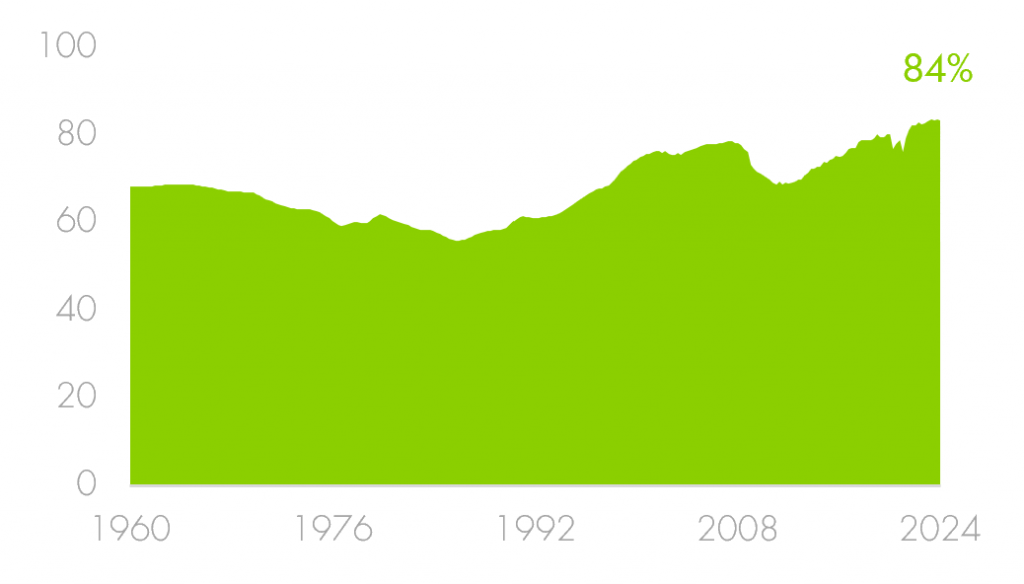- Pre-Budget Statement, BUDGET 2025 (full statement)
- Data Pack
- Report briefing presentation
- Press Release
Visual Summary
Employment is at an all-time high
% population aged 25-54 in employment
 Ireland has never had as high a share of those in their peak working years at work.
Ireland has never had as high a share of those in their peak working years at work.
Wages have started to rise faster than prices, helping to offset high costs faced in recent years.
The Government is breaching its rule
€ billion, spending and tax cuts beyond the National Spending Rule

The Government is now €12 billion beyond what the rule would have allowed since 2022.
And €3 billion beyond where it would be if it was allowing for higher-than-expected price increases.
The ongoing breaches of the rule are contributing to large and growing underlying deficits
€ billion, Council estimates of the structural balance with overruns

and higher prices
% impact on consumer prices associated with rule breaches

This equates to adding about €1,000 to a typical household’s yearly outgoings

Key Messages
Ireland’s economy is strong. It has never had this high a share of people in their peak working ages of 25 to 54 at work. Wages have also begun rising sharply, offsetting the high costs faced in recent years.
However, the Government’s “everything now” approach is adding needless pressure to the economy. The Government is planning yet another substantial budget with increases in current spending, tax cuts, and a continued ramp-up in capital spending. The package for Budget 2025 is already large. Any further overruns or untargeted cost-of-living supports will drive the Budget to almost double the size of pre-Covid packages. It will add even more fuel to price pressures. Work by the Central Bank suggests recent breaches of the spending rule will raise consumer prices by 1.9% by 2025. This adds about €1,000 to a typical household’s yearly outgoings and makes it harder for people to afford everyday essentials.
The Government might also have to reverse these promises in future. While the Government boasts a surplus, this is driven by taxes from a handful of multinationals. It is only saving half of the €11.5 billion of corporation tax windfalls it is collecting. Without these windfalls, Ireland would be in a large and growing deficit. This deficit would be even larger if not for the exceptional number of jobs in the economy at present. The underlying deficit could rise to €10 billion with further overruns. The corporation tax is mirrored by many high-pay, high-tax jobs. This adds to the risk of Ireland’s taxes being highly concentrated. If corporation tax or the exceptional numbers of people at work reverse, the Government might have to cut back on its promises, potentially when it should be supporting the economy. This would be a repeat of Ireland’s past mistakes.
The Government should stick to its rule. The rule puts a speed limit on tax cuts and spending increases. By sticking to it, the Government can curb price pressures, ensure sustainable growth, help Ireland weather future recessions, and preserve its credibility. It would avoid Ireland’s past mistakes of doing too much too quickly. While it means difficult choices, ultimately, this will help avoid needless job losses in the next downturn.
